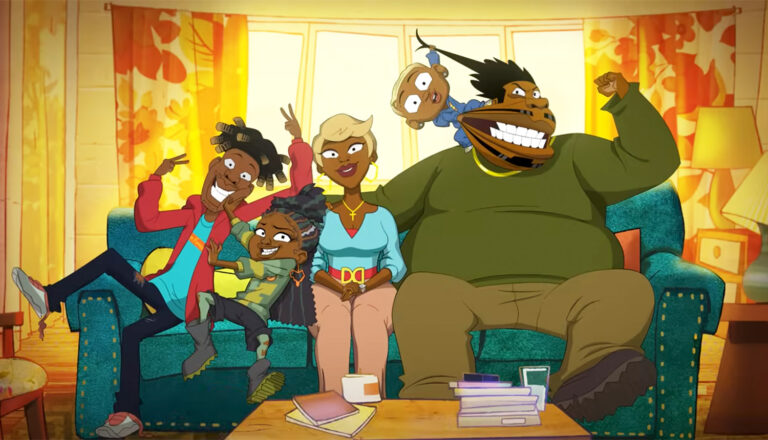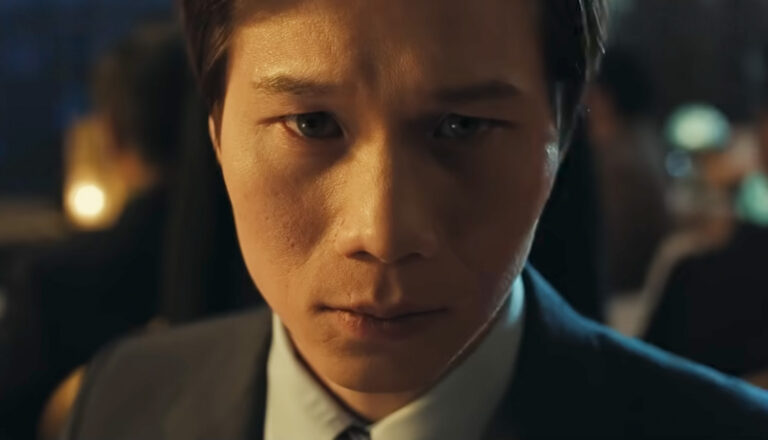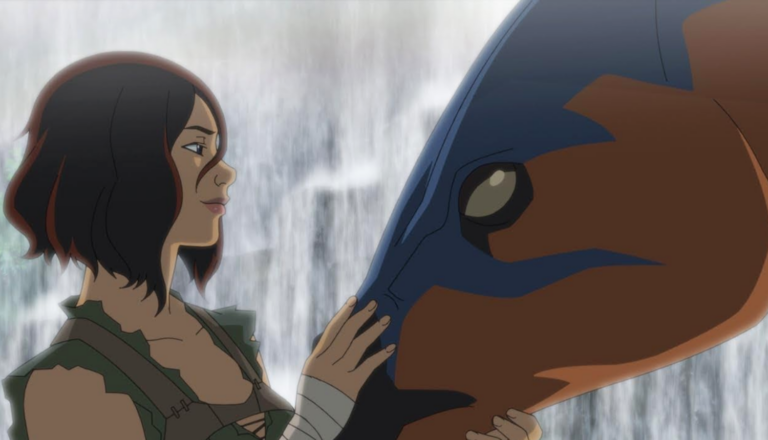
Good Times
Netflix takes a classic sitcom, Good Times, and turns it into a vulgar, violent, sexually-charged TV-MA show.

An old, old song used to talk about getting pennies from heaven. But in this version of heaven, you can’t afford to be tossing pennies out of those pearly gates.
Well, unless you die rich, that is.
Welcome to Lakeview, the Horizon afterlife service’s glamorously rustic version of Nirvana. It all seems quite, well, heavenly at first glance: the mountains are beautiful, the lake is perpetually tranquil (if a little glitchy) and the water pressure is (ahem) to die for.
But none of it’s real: It’s an elaborate program populated by the still-living minds of the dead.
Say you’re dying: Instead of being given last rites, you’re sent to an uploading chamber where your consciousness is zapped into Lakeview before you completely expire. Once in Lakeview, you wile away eternity, your every want and need met by complex AI on the virtual side of the great divide and tech troubleshooters still among the living. Happiness is yours—at least until an unfortunate power surge zaps you out of existence.
But stare a little longer, and Horizons’ version of heaven is hardly the place free of “mourning or crying or pain” (Revelations 21:4). No, this isn’t a place to reward a life well lived, but rather to honor money well spent. Don’t have enough dough to after-live well? Should’ve thought of that before giving all your money to charity, bub.
Nathan Brown is newly dead, the victim of a self-driving-car accident. He’s not rich, but Ingrid—his living girlfriend—is. Now he’s spending his afterlife in Lakeview on her tab, which sounds nice and all, only she won’t give him the password to her account. He can eat at the buffet, but no off-menu, in-app potato-chip purchases for him.
But that’s not the worst of it. See, Ingrid shuffled Nathan off to Lakeview so they can spend eternity together. (She’s just got a mere 50-60 years before she joins him there.) But Nathan wasn’t so sure he wanted an Ingrid-filled eternity when he was alive. And now that he’s met Nora, his Horizons IT specialist/guardian angel … well, being with Ingrid until time itself stops doesn’t sound quite so heavenly.
And then there’s this: Before Nathan died, he and a friend were working on a more inclusive sort of high-tech heaven, one that you wouldn’t need to go into post-death debt to afford. But oddly, those memory banks have been tampered with. And some begin to wonder whether Nathan’s lethal accident was so accidental after all.
And as Nathan’s story progresses into its third season, it’s quite evident that he was murdered. And he knows who did it. (And when your virtual afterlife is eternal, that’ll make for an awkward meet-and-greet.)
But as you might expect, anyone nefarious enough to murder another is bound to continue their self-serving deeds long after they’ve disposed of you.
You need look no further than Freeyond, Nathan’s aforementioned free prototype heaven, now in the hands of a rival company spearheaded by his murderer. And they’re offering the free uploads to everyone with their eyes especially set on poor people.
Doesn’t sound too bad, does it? Well, hold on to your CPU, because there’s some more information you need to process. You see, uploading yourself into Freeyond requires a bit more commitment than sticking some sort of USB-syringe into your arm; the process literally fries your head off with a giant laser. The people know that, of course, but they figure that virtual heaven must be better than real life.
But here’s the (other) catch: Uploaded citizens give up their voting rights. Oh, and if that’s still not nefarious enough for you, it’s not long before Nathan discovers that there’s not even any storage space set aside for Freeyond users—just a preemptively recorded message that blame an outside group for the destruction of servers that haven’t yet been destroyed.
In other words, anyone using Freeyond is being uploaded into oblivion, not paradise.
How does Nathan know all this? Can he really access all of this from virtual heaven? Well, no. With the help of some friends, he’s been uploaded into a clone body grown for him back in the real world, allowing him to taste, smell and touch all the things he did and didn’t miss.
But cloning technology is still very much in its alpha testing stage, and still has plenty of bugs to work out. And it’s obvious to Nathan that the transfer didn’t go as well as he would have hoped.
Writer/Director/Producer Greg Daniels created Amazon Prime’s off-brand heaven, and it’s not his first foray in world-building. He’s the brain behind such classic sitcoms as The Office and Parks and Recreation (he worked for The Simpsons and King of the Hill, too), so he knows a thing or two about comedy, if not theology.
No surprise that Upload has some clever things to say.
The main target for Upload’s humor isn’t necessarily religion or the afterlife, but rather 21st-century consumerism and our adoration of technology. In Horizons’ view, heaven is all about rewarding the rich, not the good—and even the wealthy have to put up with in-afterlife ads and micro-purchases. Those who don’t have the cash for a good afterlife get the cut-rate version, which can look a lot like … well, the other place.
But as Nathan’s own story illustrates, Horizons’ facsimiles of both heaven and earth fall short of the real things. Through its satirical lens, Upload reminds us that the best things in life are free: life. Love. Connection.
“Life isn’t perfect, but life is the most magical gift there is,” Nora tells Nathan in the opening episode. “And if there’s God, He’s amazing, because He gave us life, and the gratitude and creativity to keep it going as long as we possibly can.”
And in that semi-honorable statement, we find the show’s first layers of difficulty.
Nora’s own sick father turns down Nora’s offer of a Horizons afterlife, preferring to believe in a greater one. “It doesn’t make sense but it’s how I feel,” he says. “How can heaven not have your mother in it?”
But he’s a rarity here. Most characters seem to have given up the quaint notion of faith long ago. Nora chides her father for his “old-fashioned” ideals. The fact that so many people place their faith in Horizons is both part of the satire and, on another level, a bit dispiriting. As Nora’s quote suggests, the show is about celebrating life. And that’s great as far as it goes, but it offers no real hope or optimism—at least early on—for a real afterlife.
And that doesn’t even touch on other philosophical concerns that come later in the show.
As we noted above, cloning plays a large role in later seasons. artificial intelligence sentience begins to take root. And it seems that one character has been uploaded twice, with one instance living on in a clone and the other in virtual heaven, both blissfully unaware of the other’s existence.
If the show’s philosophy doesn’t put you off, its content might. Amazon Prime’s Upload is streaked with nudity and sex, as living people use “sex suits” in order to experience intimacy with their virtually deceased. Upload is also pocked with bad language, including the f-word. Gore can be a problem, too, as some characters quite literally have their heads exploded. Bathroom humor is rife, and gags about drug and alcohol use proliferate, as well.
Upload offers a high concept with high ambitions. But in some respects, the show shoots far lower.
Nora and the newly-downloaded Nathan race to stop people from uploading themselves to Freeyond on its launch day.
A man and woman passionately kiss. A man wearing just a long shirt (which covers him) claims to be pregnant as a new feature of virtual heaven. He jokes if another man would like to co-parent with him. He also asks Nathan if he and a woman have been having sex, which Nathan says has been the “most elaborate booty call” of his life. A woman sells lingerie. Nathan admits that he’s been farting more ever since he got his clone body.
We see two different men’s heads explode in a blast of red goop. Other people are lasered in the head, and when the laser is shut off, their heads are gone, leaving only bloody neck stumps. The bodies of these people are loaded into a garbage truck. A man is shot in the stomach. Another man is fried through the stomach with a laser, leaving a sizeable hole all the way through his body.
Someone says “I would trade my vote for a chance at heaven.”
The f-word is used 12 times, including one time that is preceded by “mother.” The s-word is used seven times. We also hear one use of “a–” and “d–n.” God’s name is used in vain nine times.
Programmer Nathan Brown is injured in a car accident. Doctors could possibly still patch him up, but his girlfriend, Ingrid, talks him into going to Horizons’ upload center instead, where his mind and soul (or what passes for a soul here) are uploaded into Horizons’ elaborate afterlife program. But once he’s there, Nathan realizes that this virtual “heaven” isn’t quite what he imagined.
The idea of a real, faith-centric afterlife seems to be largely treated as a fantasy in this Amazon Prime future. Some still seem to believe in it, but our main characters put their trust in Horizons to handle their afterlife needs—including spiritual ones. The afterlife that Nathan’s sent to is an interfaith community: While Horizons’ programmers see (a bit derisively) that Nathan comes from a “non-denominational charismatic Christian” background, one promises Nathan that the Pentecostal church Nathan currently sees on the corner can be converted into a mosque or a bowling alley if he so desires. (Nathan desires the latter.)
But the afterlife has some serious acknowledged drawbacks. Nathan’s shown the data stream from the living world to the Horizons afterlife (which, among other things, allows the living and the dead to talk with each other), and he’s told that many people have actually jumped into that stream and, thus, annihilated their consciousnesses. Nora and a coworker say that the rejection rate for the “unprepared” ranges between 40 and 60%.
Before his accident, Nathan and Ingrid have sex in a self-driving car. We see both of them topless from the waist up (with Ingrid’s breasts barely, strategically hidden), and motions suggest other sexual activities. Another couple has noisy, obvious sex next to a blissfully oblivious roommate. They’re both naked and seen from the side, and we see everything you’d expect to see from that position. Nathan’s bare posterior is seen after his consciousness is uploaded, and we see the guy take a shower, too. We hear some crass, sexually charged jokes. Nathan’s next-door-neighbors in the afterlife are two gay men. One mentions that his eternal mate was the “first man I ever kissed.” We hear about the afterlife’s virtual sex programs.
Someone’s head is vaporized. Nathan’s car crashes into another vehicle: We see the impact (fairly comedic as car crashes go) and watch as a badly cut-up (but fully conscious) Nathan is wheeled through hospital corridors. He’s told that he’s dying because of a punctured lung.
Nathan marvels at his ability to urinate in a urinal, regardless of where he’s standing (or what he’s doing) in the lavatory. (We see the stream of urine extend like a wire from his unseen privates and into the privy, occasionally narrowly missing a bathroom attendant.) He and Nora discuss flatulence in heaven.
Nathan disables his car’s self-drive function and careens somewhat recklessly down the road—flirting with a virtual police officer when he’s pulled over. Characters drink wine, and Nathan’s car wonders whether he’s “drunk. Again.” Characters say the f-word 16 times, the s-word 13 times and utter other profanities such as “a–,” “b–ch,” “b–tard” and “h—.” God’s name is misused eight times.


Kennedy Unthank studied journalism at the University of Missouri. He knew he wanted to write for a living when he won a contest for “best fantasy story” while in the 4th grade. What he didn’t know at the time, however, was that he was the only person to submit a story. Regardless, the seed was planted. Kennedy collects and plays board games in his free time, and he loves to talk about biblical apologetics. He thinks the ending of Lost “wasn’t that bad.”

Paul Asay has been part of the Plugged In staff since 2007, watching and reviewing roughly 15 quintillion movies and television shows. He’s written for a number of other publications, too, including Time, The Washington Post and Christianity Today. The author of several books, Paul loves to find spirituality in unexpected places, including popular entertainment, and he loves all things superhero. His vices include James Bond films, Mountain Dew and terrible B-grade movies. He’s married, has two children and a neurotic dog, runs marathons on occasion and hopes to someday own his own tuxedo. Feel free to follow him on Twitter @AsayPaul.

Netflix takes a classic sitcom, Good Times, and turns it into a vulgar, violent, sexually-charged TV-MA show.

While its protagonist might live a nuanced life, The Sympathizer’s problematic content can’t be described the same way.

Say hola once again to the iconic explorer in this faithful reboot of the children’s series.

Based on a popular video game, Ark: The Animated Series features hungry dinosaurs, bloodthirsty people and plenty of problems.